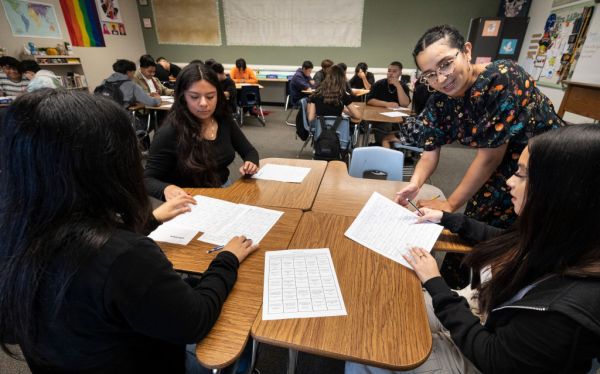Happy Thursday! The Convention and Visitors Bureau in Lexington, Kentucky, is going above and beyond to attract new tourists to the city—extraterrestrial tourists, that is. The bureau laser beamed a welcome message into space toward potentially habitable planets, inviting any aliens interested in bluegrass, horse farms, or bourbon to stop on by.
Quick Hits: Today’s Top Stories
- The Biden administration announced on Wednesday the redesignation of Yemen’s Houthi rebels as a specially designated global terrorist group amid their escalating attacks on international shipping vessels in the Red Sea. The Trump administration had previously applied the designation to the Iranian-backed group in addition to adding it to the foreign terrorist organization list, but President Joe Biden revoked both designations shortly after taking office in February 2021. “This designation seeks to promote accountability for the group’s terrorist activities,” Secretary of State Antony Blinken said in a statement released Wednesday. “If the Houthis cease their attacks in the Red Sea and Gulf of Aden, the United States will reevaluate this designation.” Yet American and Houthi forces continued to trade fire throughout Wednesday: A U.S.-owned commercial vessel was hit by a drone in the Gulf of Aden, approximately 60 miles from the Yemeni coast, and the U.S. fired a fourth round of missile strikes at Houthi targets in Yemen.
- Iran carried out missile and drone strikes in western Pakistan on Tuesday, striking Sunni militant group Jaish ul-Adl, a U.S.-designated terrorist organization that has previously launched attacks on Iran. Iranian Foreign Minister Hossein Amir-Abdollahian claimed the strikes didn’t target Pakistani citizens, just “Iranian terrorists on the soil of Pakistan.” The Pakistani government condemned the strikes as an “unprovoked and blatant breach” of the country’s sovereignty, and recalled Pakistan’s ambassador to Iran after claiming the bombardment had killed two Pakistani children. This morning, Pakistan launched retaliatory air strikes against what it claimed were terrorist hideouts in southeastern Iran, reportedly killing seven people. Iran’s foreign ministry today summoned Pakistan’s charge d’affaires in Tehran to “offer explanations” for the attacks, according to Iranian state media.
- A Maine judge on Wednesday suspended a decision to disqualify former President Donald Trump from the state’s primary ballot. Superior Court Justice Michaela Murphy rejected an appeal from Trump’s legal team to stay the case and instead remanded the case back to Maine Secretary of State Shenna Bellows, ordering her to await a decision by the Supreme Court in the Colorado disqualification case. “While it is impossible to know what the Supreme Court will decide, hopefully it will at least clarify what role, if any, state decision-makers, including secretaries of state and state judicial officers, play in adjudicating claims of disqualification,” Murphy wrote in her decision.
- Rep. Jeff Duncan, a South Carolina Republican, announced yesterday that he will not seek reelection. “At some point in a career, one needs to step aside and allow others to bring fresh ideas and abilities into the fight for liberty,” Duncan said in a statement. Nearly 40 lawmakers in the House have announced they will not seek reelection next November. Looking to return to Congress is former Democratic Rep. Dennis Kucinich, who filed on Wednesday to run for his former seat in Ohio as an independent.
K-12 Education’s Absenteeism Problem

There are lots of ways to describe being absent from school: “playing hooky,” “cutting class,” “skipping,” this scene from Ferris Bueller’s Day Off.
Nearly four years since the beginning of the COVID-19 pandemic, the classic story of a bunch of Ferrises blowing off school to lead downtown Chicago in a rousing rendition of “Twist and Shout” seems insufficient to explain the U.S. public education system’s nationwide problem with student attendance. The causes of the current crisis—which in 2023 saw rates of chronic absenteeism 71 percent above their national pre-pandemic average—are many and complex, and researchers and policymakers are still struggling to understand why attendance hasn’t rebounded. And while some states and school districts have taken steps toward boosting attendance, the scale of the problem remains daunting.
While all of us surely missed the odd day of school, chronic absenteeism typically refers to students who are absent at least 10 percent of the school year—or 18 days in the 180-day academic year. Unlike truancy, which relates only to unexcused absences, chronic absenteeism captures absences that are both excused—times when there’s a note explaining the student was sick or at the dentist, for example—and unexcused, where no reason is given.
Researchers, teachers, administrators, and policymakers generally view that 10 percent benchmark—averaging about two days a month during the nine-month school year—as the point at which being absent affects academic achievement. Missing significant amounts of school can, as one might expect, negatively affect test scores in math and reading—which are at historic lows post-pandemic. According to the National Assessment of Educational Progress (NAEP), which measures academic achievement, reading and math scores have declined in recent years for almost all student groups assessed. The 2023 NAEP scores revealed a four-point decline in reading and a nine-point decline in math as compared to the 2019-20 school year.
Chronic absence from elementary school can increase the likelihood that a student will drop out of school later, even if their attendance eventually improves. And not being at school deprives students of a host of other benefits: social and physical activity, mentorship from teachers, and free or subsidized lunches among them.
But absences don’t just affect the students who aren’t in the classroom, said Sarah Crittenden Fuller, a research associate professor at the University of North Carolina at Chapel Hill currently investigating the effects of COVID-19 on schools in her state. “Having this really elevated rate of absences is impacting all of the students,” she told TMD. “So even the students who are there—how is it impacting the dynamic of the class if you have two or three kids out almost every day? Teachers are spending a lot more time going back and reviewing.”
Although not all states collect chronic absenteeism data or report it publicly, a Stanford analysis of 40 available states (plus Washington, D.C.) found that, during the 2018-2019 school year—the last one fully uninterrupted by the COVID-19 pandemic—the national average of students who were chronically absent was around 15 percent. During the 2021-2022 academic year, when schools were largely open again following pandemic closures, that figure had jumped to 28.3 percent—a roughly 90 percent increase.
The 2021-2022 school year saw many, if not most, school districts return to in-person instruction, but that winter also saw the highest rates of COVID-19 infection of the entire pandemic. That spike may point to one reason absences remained high that year: Even if students themselves weren’t sick, they may have been kept home from school to comply with a district’s quarantine rules if someone in their household had the virus. “It could be that chronic absenteeism was a pandemic thing, and not a post-pandemic thing,” Nat Malkus, senior fellow and deputy director of education policy studies at the American Enterprise Institute, told TMD. That said, it’s worth noting that the Stanford analysis failed to find a strong correlation between absenteeism and the local spread of COVID-19 during the 2021-2022 school year.
Data for the 2022-2023 school year is incomplete, but most states reporting absenteeism numbers did see reductions in the percentage of chronically absent students. That improvement, however, has been relatively slow: The national average for 2023 was still roughly 71 percent above the 2018-2019 mean, which may also suggest there’s a more persistent problem in schools.
National averages can obscure even more alarming figures at the local level. In Washington, D.C., for example, early data suggest that some 43 percent of students missed more than 18 days of school in the 2022-2023 school year. That’s one of the highest rates in the country, and up from the already-high 30 percent in the district’s last pre-pandemic school year. New Mexico’s schools reported similarly high levels of absenteeism: Nearly 4 in 10 New Mexico public school students were chronically out of school. But unlike D.C., where the baseline was already high, the pre-pandemic absenteeism figure in New Mexico was only slightly above the national average in 2018-2019, sitting at 17 percent. That translates to a more than 100 percent increase in the percentage of students in New Mexico missing 10 percent of the school year.
And even those more revealing aggregations still don’t provide much clarity about who exactly isn’t going to school. Data compiled by Malkus’ team on the “Return to Learn” tracker show that high-poverty school districts saw a slightly larger increase in chronic absenteeism from 2018 to 2022, but middle- and high-income districts also saw more kids missing school than before the pandemic. Fuller, the UNC researcher, said that, while some patterns of elevated absences may vaguely resemble pre-pandemic levels—especially early on—absenteeism has increased across the board.
Kids who’ve tended to have good attendance are also missing more class—even if it’s not enough to technically be considered chronic. “Absences are up across the whole distribution [of attendance],” Fuller said. “It’s not just at the high end. Your median kid is absent more than they were pre-pandemic. So even the kid in the 10th percentile [of attendance]—there are almost no perfect attenders anymore.”
The pandemic clearly sent school attendance off a cliff, but why it has had such a dramatic and seemingly enduring effect is not quite as evident to researchers. Attendance Works, a nonprofit that predates the pandemic and focuses on providing data about—and solutions to—chronic absenteeism, suggests the reason for a child’s absence usually falls into one of four buckets. Some may have practical barriers to attending, while others have some sort of aversion to school stemming from academic struggles or a hostile social situation. Some may be disengaged or bored with school, while some students or their parents may also suffer from a misconception about the cumulative effect of continued absences that leads them to undervalue attendance. While those buckets are helpful, they still don’t quite explain why the pandemic had such a significant impact.
One hypothesis for why the last few years tipped absenteeism over the edge is perhaps the most obvious one: illness and a new sensitivity around going to school while sick. Parents who have spent years trying to keep their child from catching or spreading COVID-19 may now be overcautious if little Johnny has the sniffles. “The importance of showing up to school every day was relaxed for very good reasons when COVID was raging,” Malkus said. “It was extended by some school districts—for what I would call not very good reasons—but for reasons which certainly […] shape behaviors in the school districts where those closures extended. The same can be said of quarantines and the attitude that was, ‘Well you know, pre-pandemic we don’t go to school if you’re really sick.’ And now you miss school if there’s a worry about it.”
More practical barriers, like increased difficulty getting to and from school during a nationwide school bus driver shortage that was itself exacerbated by the pandemic, may also be standing in the way of attendance for some students. Half of U.S. schoolchildren rely on school buses to get to school every day, but there were 15 percent fewer bus drivers in September 2023 than there were in September 2019. For many districts, that has meant consolidating routes or eliminating them altogether, forcing parents to make other arrangements to get their kids to school. But for some children, particularly those from low-income families, no bus could mean no school.
Even as the potential causes seem endless, states and districts have introduced policy interventions—or doubled down on tried-and-true ones—to try to move the needle back down to pre-pandemic normal. Several states and school systems have implemented text communications with parents when their student reaches a certain number of absences, with some success. In some districts, school employees or contracted staff meet with parents or caregivers of chronically absent students to help get them back in class. But the marginal success may not be sufficient. “Some efforts at communicating or text messages or targeted visits or so forth—those things can be useful.” Malkus said. “But are those fixes up to the magnitude of the task that we’re looking at? I’m not very optimistic. And again, I think that if my fear about the culture problem is correct, then you really need to mobilize the entire community.”
Worth Your Time
- Writing for Politico, Nahal Toosi explored the increasingly dire concerns of foreign diplomats about the state of American politics. “When I asked the European ambassador to talk to me about America’s deepening partisan divide, I expected a polite brushoff at best,” she wrote. “Instead, the ambassador unloaded for an hour, warning that America’s poisonous politics are hurting its security, its economy, its friends and its standing as a pillar of democracy and global stability. The U.S. is a ‘fat buffalo trying to take a nap’ as hungry wolves approach, the envoy mused. ‘I can hear those Champagne bottle corks popping in Moscow—like it’s Christmas every f—ing day.’ As voters cast ballots in the Iowa caucuses Monday, many in the United States see this year’s presidential election as a test of American democracy. But, in a series of conversations with a dozen current and former diplomats, I sensed that to many of our friends abroad, the U.S. is already failing that test. The diplomats are aghast that so many U.S. leaders let their zeal for partisan politics prevent the basic functions of government. It’s a major topic of conversations at their private dinners and gatherings. Many of those I talked to were granted anonymity to be as candid with me as they are with each other. For example, one former Arab ambassador who was posted in the U.S. during both Republican and Democratic administrations told me American politics have become so unhealthy that he’d turn down a chance to return. ‘I don’t know if in the coming years people will be looking at the United States as a model for democracy,’ a second Arab diplomat warned.”
Presented Without Comment
New York Times: CNN Cancels Its Republican Debate in New Hampshire for Lack of Participation
Also Presented Without Comment
Politico: White House Called [Former Arkansas Gov. Asa] Hutchinson to Apologize for DNC Remarks
Hutchinson, who ran a campaign designed to take on and criticize Donald Trump, dropped out of the race after a sixth-place in the Iowa caucuses this week.
The Democratic National Committee initially responded by calling his withdrawal “a shock to those of us who could’ve sworn he had already dropped out.” The statement drew immediate backlash from people who said it was a gratuitous attempt to humiliate Hutchinson.
Thank You, New Hampshire!
We hope those of you who joined us in Concord had as much fun as we did!

Toeing the Company Line
- In the newsletters: The Dispatch Politics crew reported from New Hampshire on Nikki Haley’s pitch to Granite Staters, Scott argued against (🔒) policies that promote manufacturing for manufacturing’s sake, Nick explored the pattern of Republican candidates’ “deathbed confessions” as they lose to Trump, and Jonah outlined (🔒) how the 2024 election could end up looking a lot like 2016.
- On the podcasts: Chris takes over The Remnant to discuss the state of the 2024 race heading into New Hampshire with Christine Rosen, a senior fellow at the American Enterprise Institute and columnist for Commentary magazine.
- On the site: Michael Warren reports on efforts by independent and Democratic-leaning voters in New Hampshire to put Nikki Haley over the top next week, and Brian Riedl argues that Republicans need to get serious about entitlement reform and taxes.
Let Us Know
If you have school-aged children, have you—or they—noticed an uptick in absenteeism in recent years? If so, what do you think is the cause? Is it having an effect on students who are still attending school regularly?










Please note that we at The Dispatch hold ourselves, our work, and our commenters to a higher standard than other places on the internet. We welcome comments that foster genuine debate or discussion—including comments critical of us or our work—but responses that include ad hominem attacks on fellow Dispatch members or are intended to stoke fear and anger may be moderated.
You are currently using a limited time guest pass and do not have access to commenting. Consider subscribing to join the conversation.
With your membership, you only have the ability to comment on The Morning Dispatch articles. Consider upgrading to join the conversation everywhere.